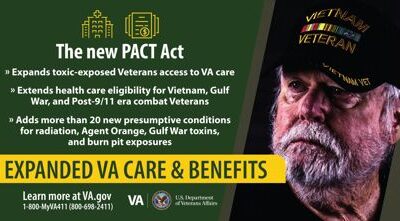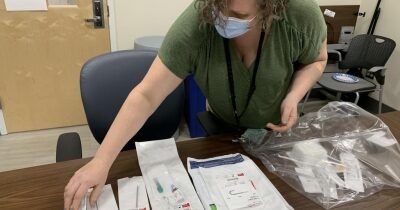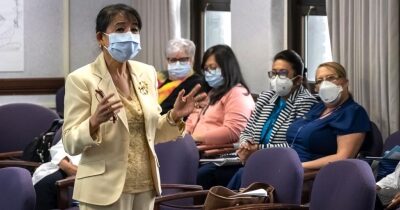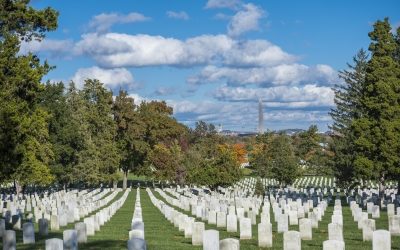During the first months of the COVID-19 pandemic, the VA was called on to serve in its “fourth mission” role as a backstop to the nation’s healthcare system.
VA Employee Sues Over VA’s Decision to Provide Abortion Services
When VA announced in September that it would be allowing department clinicians to provide abortions and abortion counseling in response to the overturning of Roe v. Wade, it was widely anticipated that there would be lawsuits from state governments that restrict abortion access.
VA Disability Claims Rejected at Higher Rates for Black Veterans
Conley Monk Jr., a Black veteran who served in Vietnam, has spent much of the past 50 years trying to get the VA to accept his claims for disability benefits, housing assistance and education benefits.
Centralized Process Ensures Equitable Distribution of Emergency-Use Authorization Medications in the VHA
Treatments used under emergency-use authorizations (EUA) have led to significant reductions in morbidity and mortality during the COVID-19 pandemic, but ensuring their safe use in the people who could stand to benefit the most from them is a formidable task
Legislators Question Whether VA Can Handle PACT Act Claims Onslaught
With the PACT Act set to officially go into effect this month, legislators are watching VA closely to see how the department deals with the hundreds of thousands of expected new claims.
Group Focuses on Telehealth Fraud at VA, DoD, Other Federal Agencies
While the pandemic has resulted in an explosion in the use of telehealth among federal health agencies, it also has created opportunities for fraud and waste, according to a recent joint report from six Offices of the Inspector General (OIGs).
OIG: Protocols to Help Prevent Suicides Not Always Followed at VA
Despite suicide prevention being a top priority at VA, clinicians are failing to consistently ask patients at risk for suicide about their access to guns.
Selection of Supply Chain Management Will Be Test of VA’s New Acquisition Framework to Assure Agency Gets Value for Its Money
As VA moves forward with its long-delayed search for a supply chain management system, the department plans to use the process as a de-facto trial of its new acquisitions’ framework–a system designed to ensure the department uses its money effectively when it comes to major projects.
Healthcare Providers Urged to Increase Firearm Safety Counseling With Veterans
Most, 70%, of suicides among U.S. veterans are due to firearm injury. Yet, according to a new study, not enough veterans are taking advantage of the opportunity to discuss firearm safety with their healthcare providers.
GAO: VA Hasn’t Addressed Core Issues in Standardized Purchasing
For the past decade, VA has struggled to implement a standardized framework for how it purchases goods and services.
VA Adds Abortion Counseling, Limited Abortion Access to Health Services
The VA has expanded its health services to include access to abortion counseling and, in limited cases, abortion to veterans and VA beneficiaries, even when restricted by state laws.
Sexual Harassment Reporting Structure Might Change at VA
Despite concerns from agency watchdogs that VA’s sexual harassment reporting process has a perceived conflict of interest, if not an actual one, the department has resisted changing it.
Legislators: VA’s Whistleblower Protection Office Is Falling Short
Bipartisan legislation currently being drafted in the House is attempting to clarify the role of VA’s Office of Whistleblower Protection (OAWP), an organization that has been fraught with challenges since it was established in 2017.
VA Focuses on Issue of Widespread Food Insecurity Among Veterans
Prior to the COVID-19 pandemic, approximately 11% of veterans were living in a food-insecure household, and 5.3% lived in a household with very low food security, meaning that eating patterns were disrupted and food intake reduced.
Reforms Put Caregiver Assistance in Danger for Most Post 9/11 Veterans
In a case of unintended consequences, as many as 90% of post 9/11 veterans currently enrolled in the VA’s Program of Comprehensive Assistance for Family Caregivers (PCAFC) were in danger of being discharged due to an ongoing wave of eligibility reforms.
GAO Report Spotlights Medical Supply Issues at VA Healthcare Facilities
Each report the Government Accountability Office (GAO) submits to VA detailing weaknesses in the department comes attached with recommendations for solving the problems.
Ho Seeks to Reduce Barriers to Care—Inside and Outside VA
Michael Ho, MD, PhD, a staff cardiologist at VA Eastern Colorado Health Care, has spent much of his professional career studying how veterans access VA and the barriers that might stand in their way.
Cost of VA-Reimbursed Community Care Is Rising Dramatically
Between FY 2017 and FY 2021, VA spending on community care rose from $10.1 billion to $21.8 billion–a 116% increase that does not factor in the costs of administering the program. At the same time, VA spending on healthcare in its own facilities grew 32%.
Severe Staffing Shortages Are Again Increasing at VA Medical Facilities
After years of improvements, severe staffing shortages are back on the rise at VA. According to a VA Office of the Inspector General (OIG) report released last month, fiscal year 2022 put an end to a three-year staffing improvement
New Legislation Gives VA Inspector General More Investigative Clout
Two pieces of new legislation would provide VA’s Office of the Inspector General with greater investigative power and employees with a better understanding of how OIG works and what their responsibilities are when asked for assistance by investigators.
VA Makes Efforts to Respond to Healthcare Workers’ High Levels of Stress
As VA employees are reporting increasing levels of burnout, and the department is facing its highest turnover rate in decades, VA has tried to put systems in place to support staff mental and emotional health.
Community Care Coordination Puts Strain on VA Staff, Finances
Since 2014, when Congress passed the Veterans Access Choice and Accountability (Choice) Act, the VA has been paying for U.S. veterans to receive increasing amounts of private sector, non-VA, care.
VA Hospitalizations Dropped Moderately After Legislation Allowing Outside Care
With the implementation of the Veterans’ Choice Act of 2014 (VCA), hospitalization within the VA healthcare system showed a modest decline.
VA Researcher Focuses on How to Prevent Staff Burnout at VA
For the past five years, Kara Zivin, PhD, MS, MA, has been “chasing burnout,” working to understand what causes it, how to measure it and what are the truly impactful measures that a healthcare system can take to combat it.
Safety Procedures Aren’t Always Followed at DHA Facilities
Dez Del Barba was only a short way into Army basic training at Fort Benning, GA, when he began to experience escalating pain in both legs. Physicians wrote it off as simple muscle soreness.
VA Leads Nation in Developing Valuation System for Health Care Innovation
The VA introduced a new value-driven framework for evaluating health care innovations in conjunction with the Digital Medicine Society (DiMe) at the Healthcare Information and Management Systems Society (HIMSS) meeting in March.
Public Health Service Bill Seeks to Put Pandemic Lessons to Use
The Senate Health, Education, Labor and Pensions (HELP) Committee recently marked up the PREVENT Pandemics Act—a bipartisan piece of legislation combining ideas from over 37 different bills and dozens of legislators.
Panel Recommends Closing Some VAMCs, More Emphasis on Outpatient Care
After months of anticipation and years of research, VA has released its Asset and Infrastructure Report (AIR), laying out recommendations for how VA should evolve its physical footprint in the coming decades.
Is VA Doing Enough for Veteran Survivors Seeking Deserved Benefits?
Part of VA’s mission is to care for the widows and orphans of servicemembers and veterans, but some legislators have expressed concern that survivors are getting short shrift, especially when the veteran dies long after their initial service rather than in combat.
VA, House Committee Consider Future of Vet Center Autonomy
As VA looks at the future of its Vet Center program and whether it is meeting current demand, one of its tasks is to find the balance between keeping Vet Centers’ historic autonomy and making sure the department is providing up-to-date care, especially for veterans who are high-risk for suicide and other mental health issues.







